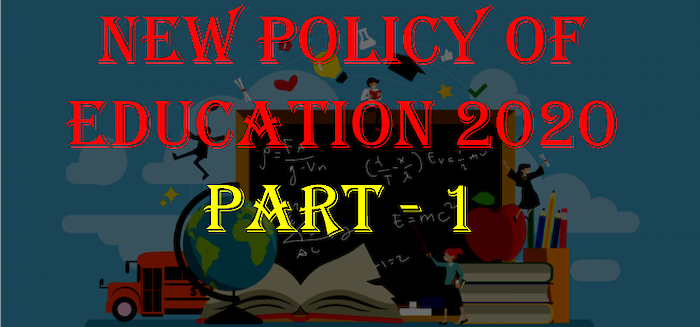I am planning to write a detailed report on National Policy of Education 2020 in parts . Hope my report gives a clear insight into the NPE2020 to everyone. I know most of these things are just what is there in the report but I am including my views with some literature study regarding the aspects. Most of the Newspaper reports regarding NPE2020 cover only certain aspects of the topic. No report gives a comprehensive view about NPE2020. So this made me to write in detail about NPE2020. All the information I have reported here are based on my perceptions of the report and certain literature surveys. So, if you feel I am wrong about any of the information please feel free to write to me about the same. To start with I am going to write about Early Childhood Care and Education (ECCE) and its implementation as per NPE2020.
At birth, the average baby’s brain is 25% the size of the average adult brain. It doubles in size by the end of first year. It keeps growing to about 80% of adult size by age 3 and 90% to full grown by 5 years. The brain is the commanding centre of the human body. All the neurons required in a human for lifetime is present right from birth. The connections between these neurons enable us to do many different functions(Physical, social, emotional and other cognitive functions). A child’s brain needs to develop the connections in the early years to be healthy, capable and successful adults. These connections are needed for many important, higher-level abilities like motivation, self-regulation, problem solving and communication. It’s much harder for these essential brain connections to be formed later in life. Research shows that when children gain a quality ECCE they are more likely to develop skills that can help them succeed in school, complete primary education and move to higher levels, transform into productive citizens and thus ensure they are better able to contribute to peaceful and prosperous societies and economies when they reach adulthood A study conducted by the National Council of Educational Research and Training (NCERT) titled, “The impact of pre-school education on retention in primary grades” (1992) on 30,000 children illustrated strong relationship between exposure to pre-school education and retention rates, attendance rates, and most significantly learning outcomes in primary school and beyond. For all these reasons - from rapid development to school-preparedness, higher numeracy and literacy, employability and eventual growth of the country, India absolutely need to invest in accessible and quality ECCE for all children. According to a report by UNICEF, despite the recognition of ECCE by the Government of India, there is still a gap between the number of pre-schoolers and those enrolled in pre-schools. The RTE Act (2009), does not include children below 6 years under its aegis. Another important aspect as per UNICEF is when children are enrolled in pre-primary education, their parents or other caregivers can go to work, knowing their children are in a safe learning environment, making early childhood education even more of a catalyst for economic growth.
NEP2020 has brought in major reconfiguration of curricular and pedagogical structure for early years as an integral part of school education in India which was a long awaited reform. Presently many kids from affordable families alone are getting opportunities to ECCE in the form of nursery and kindergarten classes. Even among them there is no uniform objectives attained. Schools don't have a common framework to decide their course content. Now with this new National Education Policy, universal provisioning of quality ECCE by 2030 is planned so as to ensure that all children irrespective of the social and economic disparities are school ready.
The curriculum framework for ECCE up to the age of 8 years will be developed by NCERT. It will be in two parts: A. 0 to 3 year old and B. 3-8 year old. The ECCE will be implemented through .
- Stand alone anganwadis.
- Anganwadis colocated with primary schools.
- Pre primary schools/section co-located with primary schools.
- Standalone primary schools.
Specially trained workers and teachers in the curriculum and pedagogy will be employed. In the meantime to bridge the present gap, current anganwadi teachers and workers will be trained. Those who have 10+2 qualifications will be made to undergo 6 month certificate programme in ECE and those with lower qualifications will have to undergo one year diploma programme covering early literacy, numeracy and other relevant aspects of ECE. Digital and distance mode using DTH channels and as well as smart phones will be the mode of training so that there will be minimal disruption to their present work. They will be mentored by cluster resource centres of the School education department at least one contact class every month.
The most important aspect of this framework is mid day meal programme being extended to these kids too. Also as it is scientifically well known that healthy breakfast is key to a child's health and attentiveness in school, breakfast will also to be provided in schools in addition to mid day meals. Health checkups and health cards will be provided to these kids. Students presently entering Grade 1 , interim 3 month play based preparatory module for all grade one students which will be formulated by NCERT and SCERT so that bridging the gap could begin. ECE will also be employed in ashramshalas in tribal dominated areas. So implementation of ECE will be a joint effort of Ministries of Human Resources and Development, Women and Child welfare Department, Health & Family Welfare and Tribal affairs. In long term state governments will prepare to train cadres of professionally qualified educators.
Another most important present problem in elementary level is severe learning crisis. Survey shows over 5 crore students have not attained foundational literacy and numeracy even after achieving grade3. In lay man words, it means majority students were not able to read and write and also they were unable to add or subtract. So this issue needs to be addressed on an urgent basis. So as per the present policy by grade 3 every student must attain foundational literacy and numeracy by 2025. To achieve this, first and foremost vacancies to be filled as soon as possible. The Pupil teacher ratio will be under 30:1. In socio-economically disadvantaged areas it will be 25:1.
National repository of high quality resources on foundational literacy and numeracy will be added on National Teachers Portal. Technological interventions to serve as aids to teachers will be piloted and implemented. Public and school libraries will be extended and digital libraries will be implemented.
Also studies show peer learning to have many advantages. So, 1:1 peer learning will be encouraged and also volunteers will be encouraged upon in helping to achieve the foundational literacy and numeracy. Everything will be with all safety aspects under the supervision of teachers.
All these efforts outlined in the NPE2020 is very much essential to make a good foundation for children. This foundation is important so that appropriate brain development occurs and has positive long-term benefits. it will help to develop 21st Century Skills in early learners as it will help in preparing them for success in school and life. It will also help in having uniform access to early childhood education across the country .Also it will remove the inconsistencies in offerings of ECCE and quality of the ECCE programme. In the subsequent parts of my series I will try to cover other aspects of the NPE2020 in detail.
[ A total of 75 Likes and 80 Loves for this article. Please caste your vote.!! ]
Comment What You Think






